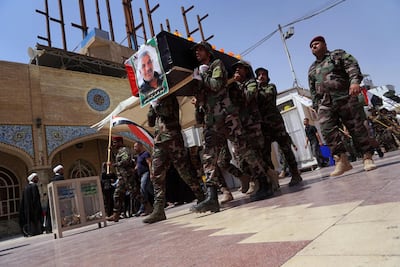Iraqi Prime Minister Adel Abdul Mahdi said his country would respond if attacked, after air strikes on Iranian-backed militias that Baghdad blamed on Israel and the US.
“Iraq will reply back any attacks by all means, whether it is an attack from inside or outside Iraq,” Mr Abdul Mahdi told the Iraqi News Agency after being briefed on the strikes on Tuesday evening.
He made the remarks during a Cabinet meeting, where ministers agreed to pursue dialogue and try to ensure Iraq does not become an arena for other nations' battles.
The Cabinet said Iraq had the right to take all the legal and diplomatic procedures through regional associations and the UN Security Council to defend its sovereignty and security.
Meanwhile, US Vice President Mike Pence spoke with the President of the Iraqi Kurdistan Region, Nechirvan Barzani, on Tuesday evening.
The two discussed the situation in northern Iraq, including the need for stability in the disputed territories and allowing the return of Iraqis, including religious and ethnic minority communities, displaced by conflict.
Mr Pence commended Mr Barzani and the Kurdistan Regional Government for providing refuge to displaced civilians and trying to protect those affected by conflict.
But the senior White House official repeated the US concern that Iran-backed militias continue to undermine Iraq's security and sovereignty.
He said that Congress would consider additional steps "to degrade such groups' influence".
The latest attack in Iraq came on Sunday, when at least two fighters belonging to the country's paramilitary groups were killed in strikes near the border with Syria.
They were killed by drones about 15 kilometres from the border, the Anbar paramilitary command said on Sunday.
One struck the headquarters of a local paramilitary brigade and the other a convoy of cars leaving the building.
Officials from the Hezbollah Brigades, separate from the Lebanese group of the same name, said the drone attack occurred near the Qaim border crossing.
They said that the attack was on vehicles belonging to the Hezbollah Brigades, also known as Brigade 45.
Other attacks have hit Iraqi weapons depots in recent weeks.

The militias have blamed Israel and the US for the attacks, but chief Pentagon spokesman Jonathan Hoffman vehemently denied the accusations on Monday.
“US forces did not conduct the recent attack on a convoy or any recent attacks that resulted in the explosion of ammunition storage facilities in Iraq," Mr Hoffman said.
"Statements to the contrary are false, misleading and inflammatory.”
He said the US supported Iraqi sovereignty and had a history of speaking out against foreign forces inciting violence there.
“The government of Iraq has the right to control their own internal security and protect their democracy," Mr Hoffman said.
"They are conducting an investigation into the recent attacks accordingly.
“As guests of Iraq, US forces operate at the invitation of the Iraqi government and comply with all laws and directions. We are fully co-operating with the investigation.”
Mr Abdul Mahdi was expected to visit Washington this summer but the trip is tentatively planned for October.
Israel has hinted at its involvement in the attacks.
The country said it feared Iran could transfer weapons to allies in Iraq, Syria and Lebanon that could be used to attack it.
It claims it carried out hundreds of strikes against Iranian forces and their allies in Syria to reduce that threat.
Meanwhile, US National Security Adviser John Bolton on Tuesday said President Donald Trump’s willingness to hold direct talks with Iran did not mean there was any change in his administration’s stance towards the country.
"The idea that Iran would receive some tangible economic benefit merely for stopping things it shouldn't have been doing in the first place is just a non-starter," Mr Bolton told Radio Free Europe on a visit to Ukraine.
“If there is a comprehensive deal then of course the sanctions will come off at that point. When the regime in Iran is ready to talk about that, then there’ll be a meeting."
Iran has said there will be no talks until the sanctions are lifted.

